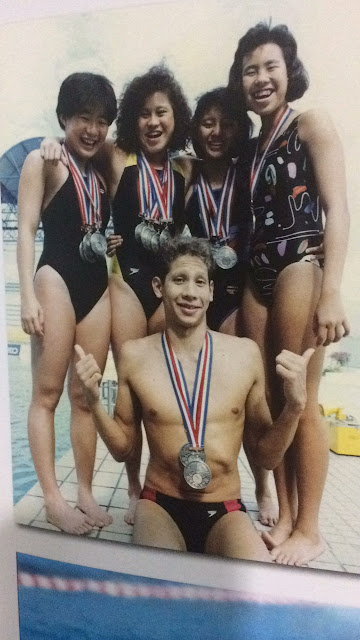By Tony Mariadass
Pictures by: Mukhriz Zabidi
JEFFREY ONG, a household name in the 1980s and 1990s is back
after 14 years in London and ready to serve sports.
The 44-year-old swimmer who represented Malaysia at the 1988 Seoul Olympic Games as a 16-year-old and at the Barcelona Games four years later, still holds the national 1,500m freestyle record of 15:23.16s set at the World Student Games in Sheffield in 1991.
“It is nice but I am surprised no one has bettered it,” said the 1988 Sportsman of the Year.
Asked why he returned, he replied: “My parents and friends are here. I love the food and above all missed home and the weather.”
Jeffrey, who graduated from University of Southern California with a B.A. in Broadcast Journalism and a minor in Psychology (1990-1994), where he was a member of the USC Swim Team as well as an NCAA All-American swimmer, left for England in 2002 to be with girlfriend Carolyn Goh. They are now married and have a five-year-old daughter, Olivia. “It was supposed to have been until she completes her studies, but she then did her Phd and one thing led to another and we stayed on,” explained Jeffrey, who has been appointed CIMB Classic regional commercial director for corporate sponsorship and hospitality.
The 44-year-old swimmer who represented Malaysia at the 1988 Seoul Olympic Games as a 16-year-old and at the Barcelona Games four years later, still holds the national 1,500m freestyle record of 15:23.16s set at the World Student Games in Sheffield in 1991.
“It is nice but I am surprised no one has bettered it,” said the 1988 Sportsman of the Year.
Asked why he returned, he replied: “My parents and friends are here. I love the food and above all missed home and the weather.”
Jeffrey, who graduated from University of Southern California with a B.A. in Broadcast Journalism and a minor in Psychology (1990-1994), where he was a member of the USC Swim Team as well as an NCAA All-American swimmer, left for England in 2002 to be with girlfriend Carolyn Goh. They are now married and have a five-year-old daughter, Olivia. “It was supposed to have been until she completes her studies, but she then did her Phd and one thing led to another and we stayed on,” explained Jeffrey, who has been appointed CIMB Classic regional commercial director for corporate sponsorship and hospitality.
While in London, he worked in the conferences and events industry, developing commercial partnerships with leading multinational corporations.
Jeffrey also successfully sold sponsorship managed events in the architecture and design, infrastructure and project finance, and travel trade sectors.
Besides swimming, he is also remembered for his appearances on TV3 from 1995 to 1997 where he did news-gathering, reporting, researching, scriptwriting and hosting. He also did freelancing on TV production, hosting, deejay and media work.
As part of his plan to give back to sports, Jeffrey was elected as deputy president of the Malaysian Olympian Association (MOA) unopposed two weeks ago.
“I hope through the guidance of president Karu Selvaratnam and several senior Olympians, we will make MOA more relevant and contribute to the development of sports,” said Jeffrey a member of the Olympic Council of Malaysia Hall of Fame who was inducted last year.
Jeffrey also successfully sold sponsorship managed events in the architecture and design, infrastructure and project finance, and travel trade sectors.
Besides swimming, he is also remembered for his appearances on TV3 from 1995 to 1997 where he did news-gathering, reporting, researching, scriptwriting and hosting. He also did freelancing on TV production, hosting, deejay and media work.
As part of his plan to give back to sports, Jeffrey was elected as deputy president of the Malaysian Olympian Association (MOA) unopposed two weeks ago.
“I hope through the guidance of president Karu Selvaratnam and several senior Olympians, we will make MOA more relevant and contribute to the development of sports,” said Jeffrey a member of the Olympic Council of Malaysia Hall of Fame who was inducted last year.

“MOA will have our first executive council meeting next week and we will discuss and map our plans.”
Jeffrey said the nation has tremendous potential but the talent needs to be nurtured.
“Malaysia can become a sporting hub for the Asean region and we should exploit it.
“I am confident Malaysia’s elusive Olympic medal will come in Tokyo,” he said.
“We reached greater heights compared with yesteryears with world No 1s in Lee Chong Wei and Nicol David.
“We should also use the next year’s Kuala Lumpur SEA Games as a launch pad for further excellence.”
Jeffrey said states, clubs, Malaysian Schools Sports Council are important but urged parents to take a bigger role.

“If not for my parents’ passion, dedication, determination and discipline, my sisters and I would not have been national athletes.”
His parents — Ong Eng Kooi and Rosemary — used to bring him and his sisters to Chinese Penang Club diligently from 4.30am before sending them to school and back to the pool in the evening.
Except for his older brother Steven, who swam at club level, his older sister, Katerina (Sportswoman 1980) and younger sister Angelia were national swimmers.
 |
| Jeffrey with Nurul Huda Abdullah - standing second from left - and national teammates |

Jeffrey said an athlete must have ambition, be prepared to make sacrifices, be disciplined and dedicated.
“I train for long-distance swimming and it can be very lonely just like middle distance runners. It takes a lot of patience and dedication but have no regrets.
“It is also important athletes enjoy what they do and not take it as a chore.


















